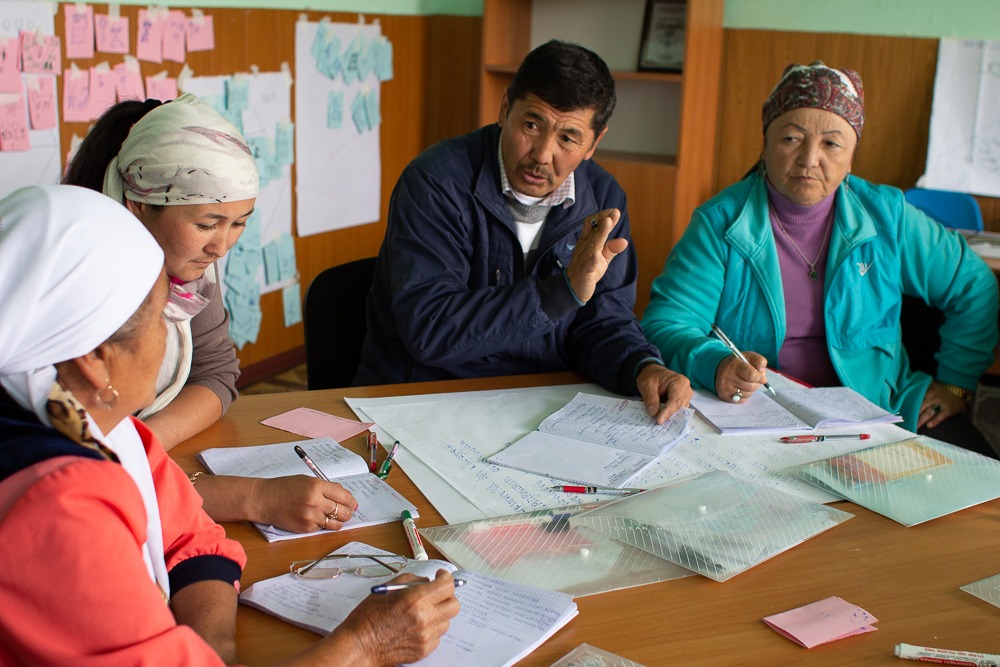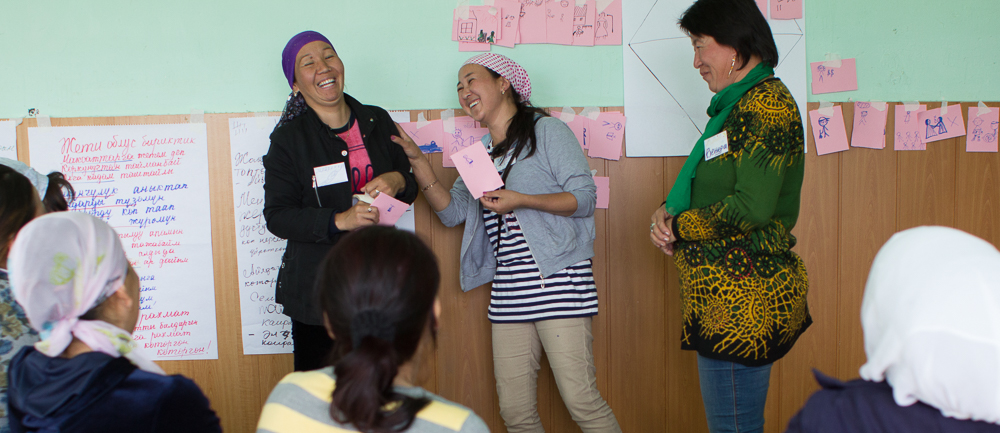









GAMEChange processes are adapted to specific contexts and programme priorities. There are no blueprints. But they generally follow three basic phases over 1 year:
- Catalyst Workshops and first Community Upscaling Workshops with first champions. 6 days plus training for the implementing organisation.
- Skills Strengthening Workshop for most active champions after 3-6 months.
- Annual Review, Leadership and Certification of First Community Empowerment Advisers and Integration and Sustainability Plan after 1 year.
Community Action Learning – champions tracking progress on their own diagrams, sharing experiences and voluntary peer sharing – takes place throughout the first year.
After 1 year the Integration and Sustainability Plan is implemented in the original areas and the same cycle replicated in new areas.
The two most comprehensive accounts are those for GALS:
But it is quite possible to change the order of tools, to start with Livelihood or Financial tools within which the GAMEChange principles of inclusion, gender justice, participation etc are integrated, then do a much more in-depth Gender Review and gender empowerment process. Leadership tools can also be introduced at an earlier stage.
Phase 1: Catalyst Phase
The Catalyst Phase is a 0-6 months process involving two parallel activities, sequenced and adapted to the overall aims and design of the intervention, the needs of the participants involved and the context. The particular form that the entry point will take, depends on the nature and focus of the intervention. It could be:
- PALS as a generic life planning process on its own, or as part of a livelihoods and value chain development programme
- GALSatScale as a gender-focused intervention
- FALS as a financial literacy and management methodology in a financial services programme
Whatever the details of the content and questions that the entry methodology is designed to address, it generally consists of:
- Inception consultations with the implementing organisations to agree on overall purpose of the PALS process, activity schedule, selection of field-testing and pilot locations and participants in the light of the overall goals and a sustainability plan. Ideally this involves a 2-3 day face to face meeting for detailed presentation of the methodology and a visit by the lead persons to an organisation already implementing PALS. Alternatively through setting up a draft blog page and e-discussion in advance and 2-3 days planning and field context visits by the external facilitator immediately before the Champion Catalyst Workshop.
- Champion Catalyst Workshop/s (5 days – preferably as 10 half days over 2 weeks) with 20-60 champions from one or more communities and organisations facilitated by GALS expert practitioner/s. This introduces at least the first four tools: Soulmate visioning, Vision Journey, Gender Balance Tree and Empowerment Leadership Map together with songs and cultural innovations and basic facilitation and peer sharing skills.
- Core staff and champion facilitation training (5 days – preferably as 10 half days over 2 weeks in parallel to champion workshops so that staff get hands-on facilitation practice)
- Community Peer Sharing Community peer sharing workshops (1 day each) immediately following the Champion Catalyst Workshops. The champions practice the facilitation skills, start to establish their leadership networks and reinforce their own understandings of the tools.
- Community Action Learning Ongoing tracking of progress at individual level, group sharing of experiences and support from the local core catalyst team. Champions then track and share progress in existing or new groups. Aiming to implement their visions and gender changes and for each champion to scale up by a factor of average 1 to 30 over 6 months.
Phase 2: Community Action Learning and Skills Strengthening
The Community Action Learning starts with the final day of the Catalyst Workshop and continues integrated into existing group meetings as identified in the Catalyst mapping process.
- Community Peer Sharing Community peer sharing workshops (1 day each) immediately following the Champion Catalyst Workshops. The champions practice the facilitation skills, start to establish their leadership networks and reinforce their own understandings of the tools.
- Community Action Learning Ongoing tracking of progress at individual level, group sharing of experiences and support from the local core catalyst team. Champions then track and share progress in existing or new groups. Aiming to implement their visions and gender changes and for each champion to scale up by a factor of average 1 to 30 over 6 months.
There is also after 3-6 months a further workshop to strengthen whatever skills are relevant for the particular programme, integrating programme themes like livelihoods, business, leadership etc into a GAMEChange diagram and facilitation framework.
Phase 3: Review and Sustainability Planning
After 1 year an Annual PALS@Scale Review and Sustainability Planning Workshop agrees or at least initiates a sustainability plan for further deepening gender and livelihood changes, strengthening leadership and scaling up for the following year.
- Achievement review brings together aggregated information on achievements on: core aims (eg livelihoods, health etc) to establish the local business/efficiency case for PALS; gender justice and deepens understanding and commitment to gender justice and women’s human rights and peer sharing networks and upscaling.
- Sustainability plan identifies the most effective strategies for pyramid peer sharing to accelerate voluntary scaling up and strengthen leadership networks and certifies a core set of the best champions who have changed their own lives and taught a significant number of people in their own communities to a good quality standard, and who have participatory facilitation skills. They will qualify to be involved in upscaling, documentation and dissemination on a paid basis in other regions (locally, nationally or internationally) in recognition of their contribution to increasing profits of the company/cooperative and/or reducing costs for the service organisation.
- Leadership and facilitation strengthening trains the champions to facilitate larger meetings using soulmate visioning, gender justice diamond, challenge action trees and organisational vision journey.
- Multimedia documentation for promotion and advocacy and to finalise training materials that can be used at different levels, establishing the business/efficiency case and covering gender issues arising to feed into gender strategies and advocacy.
Sustainable Change Movement
Over the longer term, all the above continue to strengthen, integrate and upscale, as decided in the Sustainability Plan.
The aim is to progressively hand over to and link local community activists and organisations, and bringing in local funding and stakeholders. So that energy and resources of the original implementing agencies can focus on new innovations and linking the community-led process to policy advocacy.
Over time there is progressive emphasis on addressing ‘big picture questions’ through community-led advocacy. Linking the community-led process with research institutions, particularly those interested in empowering participatory research. This could be of interest to many students doing MAs and PhDs in development, and funding could be sought through academic research institutions and research funders. Linkage with IT data solutions is also possible.

